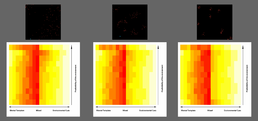FUE: Foragers in Unpredictable Environments
- Started
- 1st July 2012
- Research Team
- Iza Romanowska
The ‘Foragers in Unpredictable Environments (FUE)’ model has been designed to investigate the behaviour of hunter-gatherers under highly changeable environmental conditions. This model explores the intersection between cultural and natural adaptations. We are particularly interested in agents’ dependence on two different information sources: a culturally transmitted mental map/template of resource distribution (in this case the waterholes) and immediate environmental cues gathered from their surroundings. It was inspired by the human groups of non-coastal parts of Australia where Aboriginal tribes have developed a highly complex set of orally transmitted stories/myths which encode the location of waterholes and other resources.
The agent, representing a human group, makes decisions regarding where to move across the landscape while looking for resources based on environmental inputs as well as their own mental template of resource distribution. We model a range of strategies for resource exploitation under variable–environmental conditions in order to . We are particularly interested in how different network structures could be used to model the mental template, and whether certain structures influence the foraging success of the agents. By doing so, this model aims to contribute to our understanding of social-environmental dynamics in complex hunter-gatherer groups.
Project team: Ben Davies (University of Auckland, New Zealand), Iza Romanowska (University of Southampton, UK), Tom Brughmans (University of Southampton, UK), David O'Sullivan (University of Auckland, New Zealand).
This research was funded by World Universities Network visiting researcher grants.
Categories
Socio-technological System simulation: Archaeology, Human environment interaction, Human population, Social and Socio-economic Systems, Social Networks
Transdisciplinary tags: Complex Systems, Digital Humanities
